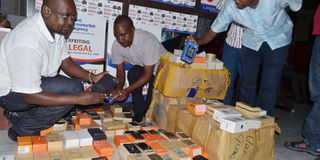Fake is not cheap, let’s embrace honesty and avoid steeper cost

Anti-Counterfeit Agency officials inspect fake phones seized during an operation in Mombasa on July 1, 2016. PHOTO | KEVIN ODIT | NATION MEDIA GROUP
What you need to know:
- Consumers might not always know it but the search for cheaper or free goods hurts them.
- Until we conquer this epidemic of dishonesty and impunity, we will never get anywhere as a society.
I watched in horror yesterday morning as a big, black, expensive Toyota Landcruiser VX, registration KCL, that was coming from Kipande Road, was driven against traffic at the Globe Cinema roundabout.
I was so shocked I stopped in the middle of the road, with my mouth wide open.
Out of curiosity, I followed the vehicle into town.
A bodyguard opened the door for a lady, who walked out, talking on the phone. She was probably late for a hair appointment.
If you cannot obey simple rules which cause inconvenience but no major pain, you will not obey the big laws which require painful sacrifice and the expenditure of huge amounts of money.
MORALS
The casual dishonesty of a person who uses the police and government resources to break traffic law exposes a fatal flaw in the Kenyan psyche.
We may present ourselves as polished and educated but our scarcity mentality — the fact that our pockets are full but our hearts keep telling our heads that they are empty — shows that, however much we pretend to be an aristocracy, in actual fact we are still peasants, hunched over a smoky fire in a hut with holes on the wall somewhere deep in Africa.
Until we conquer this epidemic of dishonesty and impunity, we will never get anywhere as a society.
This week, I got a counterfeit copy of James Comey’s A Higher Loyalty: Truth, Lies and Leadership.
I deleted it; I will buy a legitimate digital copy at only a few hundred shillings.
The reason I did that is because I know the destructive effect of dishonesty and the infringement of copyright.
CONSUMERS
Sometimes in the traffic, a driver will do something stupid that will have a knock-on effect, culminating in the foolish driver being unable to move.
In other words, you think you are smart but you only end up snookering yourself.
Consumers might not always know it but the search for cheaper or free goods hurts them.
You have noticed that medication you buy abroad has a different effect from most of what you get locally.
That is because 30 per cent of the drugs on sale here are fake.
MEDICINE
A full 40 per cent of malaria tablets, that is nearly half, which are on sale in Kenya were found to be fake a few years ago.
It is not exactly clear how many people die from using these “cost-effective” medicines, but they are bound to be many.
A 2012 report estimated that fakes occupied 40 per cent of the market.
In 2013, manufacturers were losing Sh30 billion in revenue to counterfeiters and the government Sh6 billion in taxes.
The following year, the losses were estimated to have gone up to Sh50 billion for industry and Sh20 billion for the taxman.
In the area of copyright infringement, the situation is even worse.
I am sure you have seen those guys on Telegram who offer copies of all the daily papers for a little money. To many people, it seems like a good deal.
NEWSPAPER
Others take the newspaper, read it the whole day, lend it to others to read, then in the evening return it to a dishonest trader and pay Sh20.
The copy is returned as unsold to the publisher.
Both the dishonest Telegram trader and the reader think they are being clever.
In actual fact, their conduct will, in real terms, end up costing them a lot more.
First of all, the publisher spends billions of shilling every year to produce a quality product and put it in your hands.
In point of logic, why do you expect to get it for free or at a throwaway price?
Secondly, by participating in that corrupt dealing, you undermine the ability of the producer to make that product and bring it to you. In the final analysis, you will lose it.
JOBS
Thirdly, producers can’t pay workers — which means job losses and the loss of future job opportunities.
Which means when your daughter graduates from USIU, she will sit in your house for many years to come just eating bread and putting on weight, because there are no jobs.
Finally, if you rob companies of the ability to pay — through their own taxes and the taxes of their employees — for the services you get from the government, then you will end up paying through the nose for them.
For example, if because of your love for fakes companies go down or their revenues shrink, they will pay less in taxes.
LOANS
To implement projects, the government will borrow from China or some Eurobond affair. And who will pay those loans?
You will pay until you die, then your children will take over, whether they have jobs or not, and then your grandchildren.
Meaningful prosperity requires a certain minimum level of honesty. Fakes, in actual fact, are not cheap.
Driving on the wrong side of the road may give a temporary sense of importance to the perpetrator.
But the matatu driver is watching and coveting similar privileges.
In six months, when that black KCL is driven on the wrong side of the road, there will be a long-nose monster on the left and the right, doing the same thing and four more coming from the opposite direction.
So, who is smart, then?





